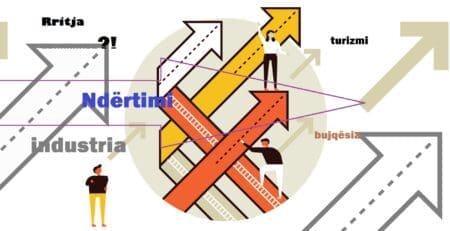The impact of increased investment on competitiveness and not just taxes
Host countries of FDI in the Western Balkans have been applying low profit tax rates for over a decade. However, it can still be seen that the attraction of investment has not tended to increase significantly, even in countries where this decline has been among the lowest in the Balkans.
When we analyze the effect of the fiscal burden according to net investment statistics as a percentage of domestic production, it is noted that countries with higher FDI do not have the same trend as the fiscal burden. The reason for not exceeding the fiscal burden and foreign investment is the strongest indicator of the role that the investment climate in a given country has in the first place.
Fiscal policy has the effect of boosting investment, but this is because market conditions and rules are perceived by investors according to investment indicators with positive situations and above their average levels. On the other hand, the need for developed systems of financial markets, road and energy infrastructure, capacities and deficient labor market capabilities along with the level of corruption have another influential effect on attracting investment and developing the domestic market.
Following the response from the representative indices of the above indicators, in accordance with the planning for attracting foreign investment, it is worth drafting fiscal policy that adjusts capital and labor tax rates according to market level and vision for capital and future market.
The perception that only low tax rates can attract FDI has had little effect on policy-making in the Western Balkans in the last decade. In theory, if a country applies low profit tax rates and generally capital, it becomes more attractive to shift the profits of investment companies, as it affects the dividend that remains as profit after tax. Albania and Kosovo are comparable in their policies with other Western Balkan countries.
But the problems of corruption and inadequate administrative capacity, the lack of transparency, and the mechanisms used in low-tax systems with the weaknesses they carry make these two countries still far from quality and long-term investment.
However, from the cross check of investment indicators, with tax rates it remains unclear whether a tax rate should really be reduced in order to attract the attention of investors, as indicators of fiscal burden in these two countries show that they are much lower than other countries. neighbors with them.
From the history of competition between the countries of the Western Balkans for tax rates as low as possible, the facts of investments made over the years show that it is not clear whether the reduction of the profit tax burden is able as the only instrument to attract large investors, but also medium ones.
But what remains unaddressed until the solution are the main structural barriers to competition, which include a relatively poor business environment , uncompetitive and rigid markets for industries that are interconnected with other markets, a difficult regulatory environment, and unpredictable, poor access to the financial market, high FDI stock in non-exporting sectors, and a large informal sector.
Competition of tax rates for FDI is a reality in today’s global and Balkan environment. It is true that investors routinely compare the burden of direct taxes in different countries, as policy makers typically do for countries that are similar in terms of market location and size.
A widely held view is that taxes are likely to be more important in choosing an investment host country if non-tax barriers are removed and if national economies converge with investment recovery requirements in the most competitive form and manner among countries. While profit tax is recognized as an important factor in investment decisions, in fact practice shows that it is not the main determinant.
The data from Competitiveness Index 2019 shows that the lowest points (show the most advanced position) compared to the WB6 average are held by Serbia with 9 pillars, Montenegro with 8 pillars, Albania with 6 pillars, North Macedonia with 5 pillars and Bosnia and Herzegovina with 2 pillars.
The dimensions of the economy are important to see the weight of fiscal policy in relation to its current maturity, as the larger the economy, the slower the performance of a fiscal reform / policy. On the other hand, the dimensions of an economy are directly related to the tax base, determining the trend of its expansion. In the case of a small economy this expansion is more difficult to happen, due to the conflict that the tax base has with the differentiated tax policy by segments.
FDI are apparently oriented towards countries that have offered access to markets and profit opportunities; a predictable and non-discriminatory legal and regulatory framework; macroeconomic stability; skilled and responsible labor markets; well-developed infrastructure and innovation; developed financial system and interconnected with the world network, meritocracy and entrepreneurial culture and an advanced level of corporate governance and growing investment in research and development.
The Balkan countries which are members of the EU, although they have a higher profit tax burden, the fact that they are part of a market with standartized rules, but also due to the guarantee of a developed infrastructure, public services and hospitable environment and attractive to business, reasonable transportation costs, including market size, then it is futile to be required to compete by Western Balkan countries only with low tax rates, without offering similar advantages as those of the Balkan member states of EU.
A low fiscal burden cannot compensate for a generally weak or unattractive environment for FDI. Also, while attention is often focused on corporate income tax, the importance of other taxes needs to be recognized.
Some businesses find that they can reduce tax burdens by changing from one form of business registration to another. This election eliminates corporate income taxes paid at the medium and large business level. Meanwhile, governments often change fiscal laws to address this avoidance or even evasion with the aim of not eroding the tax base and fiscal revenue. In fact, the biggest problem with income and the deformation of equality before the law is more related to the shortcomings in the fight against tax evasion and informality.
This gray economic space creates the premise that businesses can hide their real business status by performing undeclared transactions with this category. In these conditions and fiscal environment, it is hasty policy to make modifications to systematize and address the problem that should be made by the administration and not the policy.
Another factor is how friendly the tax and customs administration, central and local, is with the business. From the surveys and numerous reports of organizations in the protection of business rights is seen as a common conclusion, that in those countries of the region where investors find security, predictability, sustainability and timeliness in the implementation of tax rules, as well as an effective rate tax, then that environment is considered business friendly.
Balkan governments should try to improve business volunteerism by paying their budget obligations, improving transparency and security for a correct tax treatment. Looking ahead, the limits of tax competition can be further tested, by further reducing the burden of corporate taxes on foreign investment, but also by not falling prey to the fashion of tax cuts, when viewed by policy makers such as unnecessary to attract investment, due to unfulfilled qualities for attracting investment from the host country and a lack of understanding of the local context for successful foreign investment.




Leave a Reply
You must be logged in to post a comment.